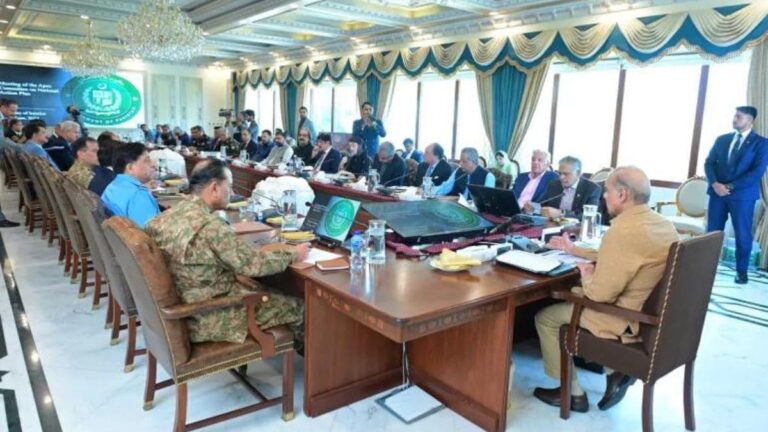Pakistan Prime Minister Shehbaz Sharif chaired a high-level meeting on June 22, 2024 on new military operations aimed at curbing escalating violence in the country. Pakistan Prime Minister’s Office
Pakistan’s top leadership has approved a new military operation called “Azm-e-Istekam,” Urdu for “determination for stability,” aimed at quelling the escalation of violence and terrorism.
The effort follows a review by Pakistan Prime Minister Shehbaz Sharif of the country’s counterterrorism operations, focusing in particular on the National Action Plan adopted after the December 2014 attack on the Peshawar Army Public School that left more than 140 people dead, mostly students, and which the Pakistani Taliban (TTP) claimed.
What is the purpose of this military operation?
The operation is aimed at addressing internal security threats and militant fighters crossing the border from Afghanistan amid rising tensions between Islamabad and Kabul. Sharif’s office announced plans to “intensify” efforts against “terrorists” through regional cooperation.
The campaign also includes socio-economic measures to address public concerns and create an environment that discourages extremist tendencies. This comprehensive strategy integrates military, legislative and diplomatic efforts to combat terrorism and extremism.
“The campaign will be complemented by socio-economic measures aimed at addressing the genuine concerns of the people and creating an environment that discourages extremist tendencies,” a release from the Prime Minister’s Office (PMO) said.
The military operation will also ensure legal support from all law enforcement agencies and address gaps that hinder the prosecution and punishment of terrorists.
“The new full-scale campaign by the armed forces will be strengthened with the full support of all law enforcement agencies empowered with effective legislation to address the legal vacuum that hinders effective prosecution of terrorism-related cases and award of punishment,” a statement from the Pakistan Prime Minister’s Office said.
The operation also emphasizes socio-economic measures to address the genuine concerns of the people and curb extremist tendencies. The information space will be leveraged to promote a unified national narrative in support of the campaign.
How is Afghanistan involved?
The announcement comes amid a surge in violence over the past 18 months, most of which have been claimed by the TTP, whose ceasefire ends in November 2022, and Pakistan has accused Kabul of harboring TTP members, a charge the Taliban government denies. Analysts predict a possible escalation if Pakistan’s operations extend into Afghanistan.
See also | Chaos in Balochistan: Why things are getting worse for Pakistan and its military
“In March, Pakistan carried out cross-border attacks on suspected Pakistani Taliban hideouts in Afghanistan, which was officially acknowledged by the foreign ministry,” said Ihsanullah Tipu, a security analyst in Islamabad. Al JazeeraTipu added that Islamabad sees military kinetic action as the most effective way to counter armed violence.
Is Pakistan following China’s orders?
The operation also addresses concerns from China, a key ally and investor in Pakistan’s infrastructure through the $62 billion China-Pakistan Economic Corridor (CPEC). Following multiple attacks, including one that left five Chinese engineers dead in March 2024, the security of Chinese nationals and projects has become crucial.
“We need to improve security and the business environment. In Pakistan’s case, the security situation is the main factor shaking the confidence of Chinese investors,” Liu Jianchao, a senior Chinese official, said during a visit to Pakistan.
But Asfandyar Mir, a South Asia expert at the United States Institute of Peace, suggested that while Chinese concerns likely influenced Pakistan’s leadership, the timing of the new operation was driven more by domestic political and economic considerations.
What are domestic factors?
“Last year, Pakistan faced a near-default on its debt and underwent contested elections amid deepening political turmoil in the country. A large-scale military operation was not feasible under these circumstances,” Mir said.
“With elections over, a government in place and the economic situation at least relatively stable, Pakistan’s leadership will be confident that it has enough domestic political space, some economic stability and can mount an aggressive campaign to address the deteriorating security situation,” he said. Al Jazeera.
Pakistan had come close to defaulting on its debt the previous year and was experiencing political turmoil during elections, making a large-scale military operation unfeasible.
With relative economic stability and a new government, Pakistan’s leaders feel confident about pressing ahead with the campaign.
Can the military operation succeed?
While the plans are strong, there are concerns about the operation’s chances of success. Abdul Said, a researcher on militant groups, said militant groups are targeting security forces to undermine government interests while maintaining public support. Without public support in provinces affected by violence, the operation’s effectiveness could be undermined.
“The Pakistani Taliban does not have a permanent base in Pakistan and instead operates from temporary bases which they change location frequently. If Pakistan conducts cross-border operations in Afghanistan, it could escalate tensions between the two countries,” Tipu said.
See alsoPakistan arrests Ahmadis for Eid rituals ‘unconstitutional’. Why they’re not
The operation seeks to restore stability and security to the country, while addressing regional and international concerns, through a combination of military action, legislative assistance and socio-economic efforts.
Information provided by the institution
Find us on YouTube
subscribe

